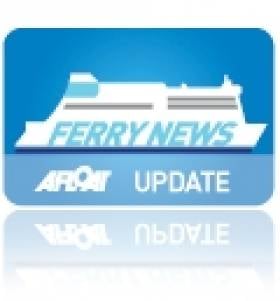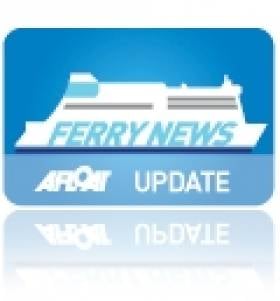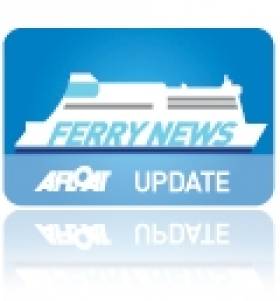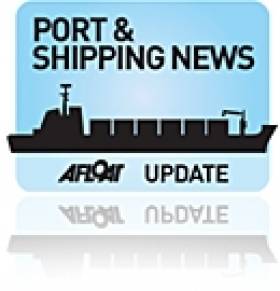Displaying items by tag: Pride of Bilbao
Brittany Ferries Roscoff Route to Re-open
The German built 41,700grt vessel stays at the port for an 8 -hour turn-around before making the seasons inaugural outbound sailing to France at 16.00hrs.
Pont-Aven can arguably claim to be the most luxurious 'cruiseferry' operating to Ireland as the vessel has a small number of luxury cabins incorporating balconies and uniquely to feature a swimming pool.
The swimming pool and leisure area can be covered over by a retractable roof. The option of the 'open-air' swimming pool may prove more popular with her 2,400 passengers as the cruiseferry also operates on a triangular route roster between Roscoff-Plymouth and Plymouth-Santander
Pont-Aven also operates a second Spanish route, Santander-Portsmouth in tandem with Cap Finistère. The 32,728grt cruiseferry last week opened a new route for Brittany Ferries also from Portsmouth to Bilbao, for details click here.
The Bibao route had closed in September when P&O Ferries withdrew from the service which since 1993 has been run by Pride of Bilbao. The 37,583grt was on charter from the Irish Continental Group (ICG) the parent company of Irish Ferries until its sale late last year to a Baltic Sea ferry operator between Helsinki-(Tallinn)-St.Petersburg, for more information click here.
Brittany Ferries Re-Open Bilbao Route
The Cap Finistere has a 790 passenger / 500 vehicle capacity and the vessel will operate two round trips weekly with each crossing taking 24 hours. Interestingly an additional en-route call to Roscoff is scheduled on Sunday sailings bound for Bilbao which will take 33-hours. This is to facilitate a crew change, as the Cap Finistere does not operate on any of the company routes from France.
In 2009 the P&O service carried 180,000 passengers and 193,000 in 2008 but closed due to "unsustainable losses". There were 800 redundancies but some 150 staff jobs were secured through transfer. Click here for a previous posting. The company were in direct competition with Brittany Ferries existing two routes between Plymouth and Poole to Santander.
The Bilbao route brings the Brittany Ferries operations to five sailings weekly between the UK to Spain, two from Portsmouth to Santander and a single round-trip to Plymouth.
The Pride of Bilbao was sold late last year by ICG to the Baltic Sea based St. Peter Line at a profit of €9.4m. The vessel underwent refurbishment and was renamed Princess Anastasia and next month starts a new St. Petersburg-Stockholm service, with Russian bound sailings calling en route to
the Estonian capital of Tallinn. Click here for more details.
Pride of Bilbao's return to the Baltic is nearly full-circle as the 2,553 passenger / 600 vehicles vessel, built in 1986 as Olympia for Viking Line's also operated out of Stockholm to Helsinki, and at the time was one of the largest overnight passenger capacity ferries in the world.
Irish Continental Group Record 61% Rise in Profit
The Irish Continental Group (ICG) which is the parent company of Irish Ferries, has warned of 'uncertainty' in 2011 due to higher fuel costs and the effects of the austerity measures in both the Irish and UK economies.
ICG secured a 61% increase in pretax profits in 2010 following an increase in passenger numbers and the sale of their MV Pride of Bilbao to St. Peter Line (click here) after a long-term charter to P&O Ferries. The 37,583 gross tonnes cruiseferry is to open a new second route for the Baltic Sea operator between St. Petersburg and Stockholm, starting next month.
To read more about ICG's end of year results, click the report in today's Irish Times.
Bilbao Returns to Baltic Sea 'Roots'
For the last 17 years the Pride of Bilbao has operated between Portsmouth and Bilbao under charter to P&O. Built in 1986, she was launched as Olympia for Viking Line between Stockholm and Helsinki, then the Baltic Sea ferry was one of the largest overnight passenger capacity ferries in the world. At 177 metres long the vessel can accommodate 2552-passengers, 600-vehicles and space for 77-trucks. She has a sister, the Mariella, which currently operates on Viking Line's Stockholm-Mariehamn–Helsinki service.
In 1993 the vessel was renamed Pride of Bilbao and launched a new service on the Bay of Biscay, under charter from her Scandinavian owners. The following year ICG purchased the Pride of Bilbao from Viking Line and she was re-registered to the Bahamas. The vessel was subsequently entered into a British bare-boat charter arrangement between P&O Ferries and ICG. Due to unsustainable losses the route closed on 28 September this year but rivals Brittany Ferries soon shortly announced they would reopen the route in Spring 2011.
Throughout the Pride of Bilbao's career under ICG (parent company of Irish Ferries), the cruiseferry has only once visited Ireland. In between Spanish sailings, she was sub-chartered for a three-day Christmas mini-cruise from Portsmouth to Dublin in 2004, where the Pride of Bilbao berthed at the ferryport close to the ICG headquarters.
Irish Ferry Leaves as UK-Spanish Route Closes
The cruiseferry, Pride of Bilbao, owned by the Irish Continental Group (ICG) made the last return sailing on the Portsmouth-Bilbao route, when the vessel
docked at the UK port yesterday (28 September), writes Jehan Ashmore.
The service was launched in 1993 with the chartering of Pride of Bilbao. In the following year, the overnight cruiseferry, owned by Vilking Line was acquired by ICG (the parent company of Irish Ferries) and the vessel was re-registered in the Bahamas.
The vessel was placed under a British bare-boat register. The charter arrangement between P&O Ferries and ICG was extended for another five years in 2002 and again for a further three years from 2007. The final charter term remained valid up to the route closure.
Orginally the Pride of Bilbao was built for Scandinavian service as the Olympia in 1986. The newbuild was launched on Viking Line's Helsinki-Stockholm route and at the time the vessel was one of the largest overnight passenger capacity ferries in the world. At 37,583 tonnes the vessel has 2,553 passengers and space for 600 vehicles. In addition the cruiseferry has comprehensive facilities and a wide choice of cabin accommodation.
The closure of the Bilbao route is temporary as Brittany Ferries are to re-launch the route in Spring 2011. The French ferry company's existing Portsmouth - Santander route ferry, Cap Finistère will also provide two sailings weekly to Bilbao. In total the there will be five sailings weekly between the UK to Spain, two from Portsmouth to Santander and a single round-trip to Plymouth. Other vessels from the Brittany Ferries fleet will assist Cap Finistere on the three Spanish routes.
After 17 years plying the Bay of Biscay, the Pride of Bilbao is now freed-up providing new opportunities for the ICG vessel. Throughout the vessel's career
under ICG, the cruiseferry has only made a single visit to an Irish port. The ship was sub-chartered for a three-day Christmas mini-cruise to Dublin in 2004 starting and ending in Portsmouth.






























































